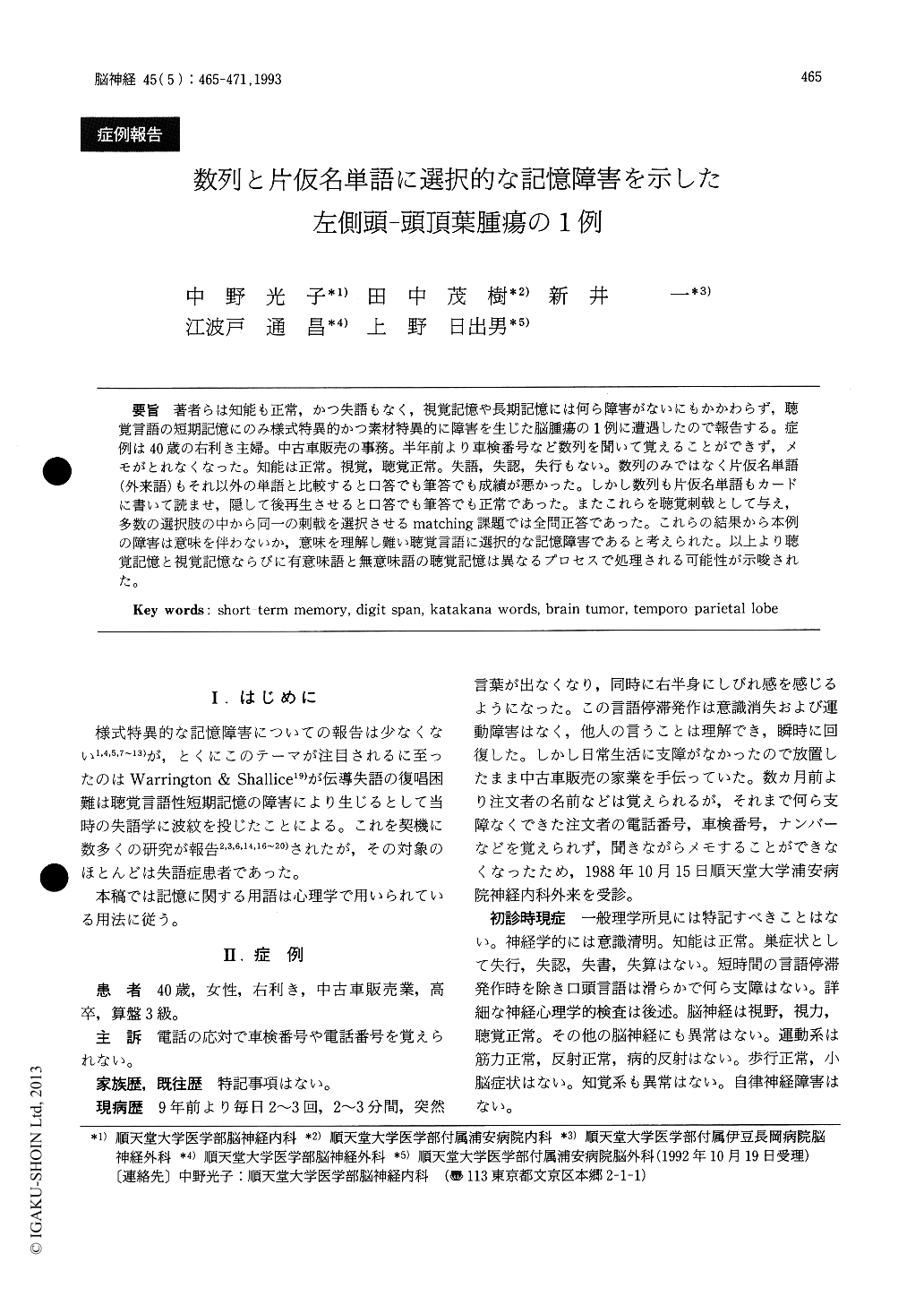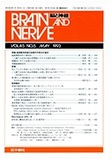Japanese
English
- 有料閲覧
- Abstract 文献概要
- 1ページ目 Look Inside
著者らは知能も正常,かつ失語もなく,視覚記憶や長期記憶には何ら障害がないにもかかわらず,聴覚言語の短期記憶にのみ様式特異的かつ素材特異的に障害を生じた脳腫瘍の1例に遭遇したので報告する。症例は40歳の右利き主婦。中古車販売の事務。半年前より車検番号など数列を聞いて覚えることができず,メモがとれなくなった。知能は正常。視覚,聴覚正常。失語,失認,失行もない。数列のみではなく片仮名単語(外来語)もそれ以外の単語と比較すると口答でも筆答でも成績が悪かった。しかし数列も片仮名単語もカードに書いて読ませ,隠して後再生させると口答でも筆答でも正常であった。またこれらを聴覚刺戟として与え,多数の選択肢の中から同一の刺戟を選択させるmatching課題では全問正答であった。これらの結果から本例の障害は意味を伴わないか,意味を理解し難い聴覚言語に選択的な記憶障害であると考えられた。以上より聴覚記憶と視覚記憶ならびに有意味語と無意味語の聴覚記憶は異なるプロセスで処理される可能性が示唆された。
We report a patient with selective short-term memory disturbance caused by a glioma in the left temporal-parietal lobe. The patient was a 40-year -old righthanded housewife who complained of difficulty in memorizing series of numbers. She was working as a car dealer. She was well until 6 months prior to the present admission when shenoted a difficulty in memorizing series of numbers such when telephone numbers and car registration numbers. She had to write them down as her cus-tomers told them to her.
On admission, she was alert and oriented to all spheres. She was mentally sound without dementia. She did not show aphasia, apraxia, or agnosia, except for brief periods of seizures in which she became unable to speech. Neuropsychological exa-mination revealed that she had difficulty in repeat-ing and dectating series of numbers and meaningless kana words. However, she could easily pick up the correct series of numbers or kana words among multiple choices presented visually. Thus it was clear that her problem was not the disturbance of auditory input nor expression, but a selective impairment of short-term memory. She could memorize the same stimuli when visually presented. Therfore, her problem was thought to be a distur-bance of auditory short-term memory of meaning-less words.
After resection of her tumor, she developed tran-sient amnesic aphasia, which improved a year later. She was examined again in her memory function. In the task of visual stimuli, we presented her a card in which a series of numbers or a nonsense syllable was written for 5 seconds, and asked her to remem-ber them. After the card was turned over, she was asked to recall the stimli verbally or in writing. In the task of auditory stimuli, we read the stmuli aloud. After that, she was also asked to recall the stimuli verbally or in writing. These results showed that her visual-verbal short-term memory of mean-ingless words was superior to its auditory-verbal short-term memory. And in the auditory-verbal short-term memory, the memory of meaningless words was worse than meaningful words.
Thus the clinical findings and neuropsychological results were consistent with the selective distur-bance of auditory-verbal short-term memory. It is suggested that the auditory-verbal short-term mem-ory of meaningless words may be handled differently from the visual-verbal short-term mem-ory. And that the auditory-verbal short-term memory of meaningless words may also be differently from the meaningfull words.

Copyright © 1993, Igaku-Shoin Ltd. All rights reserved.


